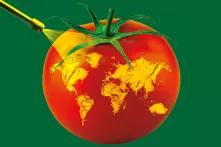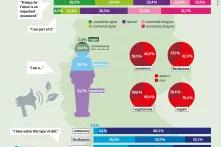Young people in Germany are worried about pesticide use in agriculture and call on politicians
to take action. They demand more emphasis on ecological management of fields and plead for stronger support for farmers.

Pesticides are a perennial issue in the environmental debate: For years, many consumers have cited agrochemicals in EU-wide surveys as one of the biggest challenges in food safety. Concerns about pesticides are a well-researched motivation to buy organic food. And growing awareness of the problem of insect protection also suggests that environmental risks are becoming a more important topic.
Recent youth studies and the Fridays for Future movement show a high level of climate protection awareness among teenagers and young adults. However, the extent to which pesticides are seen as a problem for this age group has been largely unclear due to a lack of studies. How do the majority of young people in Germany view agriculture and its impact on environmental protection and species conservation? Is pesticide use even an issue for younger generations? As an attempt to find answers to these questions, 1,131 young adults in Germany were polled in October 2021 for the Pesticide Atlas. The online survey for the 16 to 29 years age group is representative in terms of gender, educational attainment, and regional distribution of respondents.
The results sketch a picture of a generation aware of planetary limitations that is demanding more commitment from policymakers so that agriculture can produce food in an environmentally and sustainable way. There is widespread interest in the ways production is carried out – only very few of the young respondents (7.2 percent) said they did not care about the issue. Awareness of risks associated with pesticide use in agriculture is high.
About two-thirds consider pesticide usage to be dangerous. The main concerns relate to water and groundwater protection. Then, respondents are concerned about impacts on air and soil. The impact on their own health only comes in fourth place in the list of concerns.
The adverse effects on biodiversity are also worrying to a clear majority: The decline in pollinating insects and bird species is somewhat more in the focus than the loss of wild herbs and grasses. The problems caused by pesticides are seen as numerous. There is clear support for biological crop protection, for example the use of beneficial insects as biologically sustainable pest controllers. New farming management technologies from the field of precision farming – such as self-propelled robots for weed control or precise pesticide application – are greeted with scepticism.
The reputation of pesticides and the crop protection industry is rather bad. In contrast, organic farming is seen as sustainable and modern. Many of those surveyed believe that organic farming has advantages in terms of insect protection and is a promising approach to achieving respectful treatment of nature. Overall, organic farming is associated with clear benefits for the environment and wildlife conservation – about 60 percent say they buy organic food for these reasons. Looking at the situation of farmers, young adults see major challenges: 70 percent assume that it is difficult to do business under the current conditions. The commitment of farmworkers is held in high esteem – as evidenced by the high importance attached to the issue of fair pay. However, trust in the industry’s problem-solving ability is low. From the respondents’ perspective, agriculture is constrained by circumstances. Less than a quarter of respondents believe responsible pesticide use is feasible. Almost three quarters call on policymakers to reduce pesticide usage. The policy instruments surveyed are consistently well supported. Respondents were also asked to indicate how they assess frequent arguments in the public debate. Confronted with three arguments each from the environmental perspective and industries’ point of view, the environmental positions meet with greater approval. 74 percent of respondents consider the link between pesticide use and biodiversity loss plausible. On the other hand, only 35 percent are convinced that “the world’s food supply is at risk without pesticides”. There are four groups among the respondents: The largest group is the ‘Uncertain’ (42 percent), who do not take a clear position on all the arguments presented. For two groups, the environmental arguments are decisive – the core group of ‘pesticide opponents’ (10 percent) and the ‘pesticide sceptics’ (29 percent), who are not quite so clear in their rejection. The ‘weighers’ (18 percent) can understand arguments of both sides.
The survey ended with a question about perspectives on handling of chemical crop protection: Should pesticides still be used in the future? Given the choice between unrestricted use, sparing use, use only in exceptional cases and a ban, 48 percent of respondents opted for “use as a last resort in exceptional cases”. Another 32 percent are in favor of sparing use. 20 percent would recommend a ban. Only just under 1 percent are in favor of unrestricted use. These are ambitious reduction targets that go far beyond what policymakers have been aiming for so far. 80 percent of respondents express willingness to support a signature campaign calling for gradual elimination of pesticides and aid for farmers converting their businesses.
Altogether, the study shows that young people between 16 and 29 years are in favor of agriculture that either does without chemical-synthetic crop protection or at least reduces the amount applied significantly. Farmers are seen as being driven by an agricultural system that imposes unfair conditions and restrictions.

